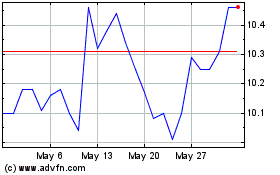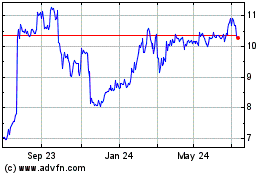Republicans Near Agreement With Treasury Department on Puerto Rico Bill
May 18 2016 - 5:20PM
Dow Jones News
WASHINGTON—House Republicans are close to finalizing an
agreement with the Obama administration on legislation to provide
Puerto Rico a path to restructure its $70 billion debt load.
With nearly all other details ironed out, disagreements remained
over how to handle appointments to a seven-member board designed to
oversee the island's finances. There were also lingering
differences over how to respect constitutional priorities governing
bond and pension payments.
A successful legislative package would give the island its first
chance in years to ease a mounting debt burden that threatens to
prolong its decadelong recession. The bill would offer the island a
legal out similar to bankruptcy, and wouldn't commit any federal
money.
The bill follows weeks of delicate bipartisan negotiations
between the Treasury Department and conservative lawmakers leery of
interfering with bondholders' contracts. Democrats have called for
broader latitude in restructuring those debts.
Last month, House Republicans pulled an earlier iteration of the
legislation from committee consideration after objections surfaced
on both the left and right. Treasury officials called the details
of a proposed debt restructuring unworkable, while a muscular
advertising campaign from some bondholders characterized the
legislation as a bailout, making conservatives uneasy.
Those setbacks underscore the fluid state of play on legislation
that has enjoyed an unusually bipartisan process, and a bill isn't
likely to be introduced without assurances that the administration
won't oppose it.
House Natural Resources Committee Chairman Rob Bishop (R., Utah)
said last week that he expects that once Republicans reached
agreement with the Treasury Department on the legislation, it would
move "very quickly" through Congress. House Republicans said they
planned to introduce the latest version of the bill Wednesday.
Puerto Rico has defaulted on different classes of bonds,
including earlier this month when it missed most of a $422 million
payment, and faces payments totaling $2 billion on July 1.
Municipalities in many U.S. states can seek bankruptcy protection
in court, but Puerto Rico can't because territories are excluded
from the relevant part of the federal bankruptcy code.
Last week, Treasury Secretary Jacob Lew and Mr. Bishop
separately warned that failing to provide effective
debt-restructuring relief now would lead to louder calls later for
a bailout of the island and its bondholders. "If Puerto Rico spins
out into economic chaos, you may never have a chance of recovering
again," Mr. Bishop said last week.
The reintroduction of the legislation was repeatedly delayed
last week as aides to House Speaker Paul Ryan (R., Wis.) sought to
iron out differences with top officials in the Obama
administration.
Pensions emerged as a complicating factor because in addition to
Puerto Rico's $70 billion debt, the island has an unfunded pension
liability of some $40 billion. Puerto Rico has been in a recession
for most of the past decade, and it is steadily losing population
to the mainland, depleting its tax base.
Some bondholders have argued legislation should require pensions
to be reduced before their bonds are restructured, while some
Democrats have said pensions should be made senior to those bonds.
The bill does neither, and instead says the control board must
ensure pensions are adequately funded while respecting existing
law.
Write to Nick Timiraos at nick.timiraos@wsj.com
(END) Dow Jones Newswires
May 18, 2016 17:05 ET (21:05 GMT)
Copyright (c) 2016 Dow Jones & Company, Inc.
Pacific Current (ASX:PAC)
Historical Stock Chart
From Apr 2024 to May 2024

Pacific Current (ASX:PAC)
Historical Stock Chart
From May 2023 to May 2024
